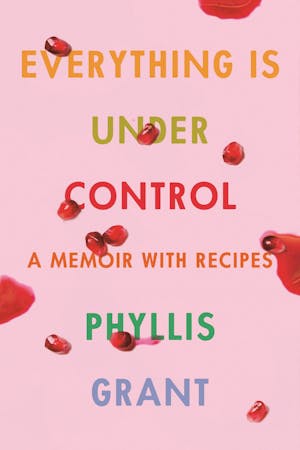Here, there is no intense heat.
I whack the cold dough with my rolling pin.
There is no Chef.
I lean all my weight into the flattened disc.
No dupes.
Roll, spin, quick flip, flour, exhale.
There is no judgment. No sweat. No VIPs.
My heart starts to race.
There are only my children, perched on stools, trying to control their eager hands, excited to fill their hungry bellies.
When my great-grandfather, on my mother’s side, dies of myasthenia gravis, his business partner takes everything and my great-grandmother falls into a year of anxiety and deep depression. She goes away to a sanatorium while her daughter, my grandmother Phyllis, lives with relatives.
My great-grandmother finally moves back home and takes two jobs in order to make ends meet. While she drives a school bus and works as an ophthalmologist’s assistant, my grandmother Phyllis is in charge of meals. There is no Hamburger Helper. No takeout. No frozen pizza. So she learns to cook. She is ten.
Wait. Assembly line. Please cut all the apples in half before you start peeling them.
But why, Mom? My son wants to do it his way.
My daughter eye-rolls in his direction. She understands. She keeps her closet color-coordinated and her socks in a neat little row.
She smiles. I smile back. And then I cut myself.
As my daughter wraps my finger in a Band-Aid, I tell my kids about how I used to cut myself several times a week when I worked in restaurants. Sometimes a little nick, sometimes a gushing wound that three Band-Aids and a finger cot could not contain. How I would squat down behind the lockers, my hand wrapped in a bloody apron, begging my finger to stop bleeding so I could get back to my station before the Chef saw that I was gone.
My son speed-climbs up onto my hip, charmingly invading my personal space in the way only a five-year-old can.
But why were you embarrassed?
I place him a safe distance away on the counter and nestle the sliced apples down into the hot sugar and butter.
Because I knew nothing, my love.
I wrap the dough up on the rolling pin and unroll it out over the apples, quickly tucking the edges down with a butter knife. My chest tightens and starts to ache.
But now you know everything.
I don’t correct him.
My grandmother Phyllis marries a painter who likes his gin, his Mozart, his cigarettes. And so does she. They settle in Berkeley, California, with their two kids, where she continues cooking the inexpensive comfort foods of her youth. Tough cuts of lamb become stew. Stale bread is for cheese toasts or croutons. Ham hock flavors a pot of split pea soup that lasts for days. Eggs are baked in ramekins or scrambled or turned into soufflés. There is no waste.
While there is a formality to things—napkin in your lap, no milk bottles on the table, don’t eat over the sink—the table is also the easiest place to be. No rushing. No shortcuts. Every meal counts.
My daughter opens the oven door. I slide in the tarte tatin. She goes back to her homework world. My son and I sit on the dirty floor in front of the oven and wait.
Mom, there’s a problem.
What?
Mom, I don’t think I can look at you and say what I’m thinking.
I pull him into my lap and cradle his impossibly long body, carefully covering his eyes with my hands. I feel his heart racing in his eyelids.
Mom, I don’t want to die.
Did you know that we all die?
No we don’t. Not the Easter Bunny or Santa Claus.
But they’re all crazy full of magic.
I just don’t know how it will feel to die.
He nuzzles his face in the crook of my arm, smearing dirt, snot, tears on my sleeve. We hold hands and rock.
My grandmother Elizabeth, on my father’s side, grows up in Minnesota with a mother who can create a meal out of a seemingly empty cupboard and a dairyman father who spends hours tending to his cheeses, coaxing and trimming with his special knife, storing them all in a dedicated refrigerator. Elizabeth’s brother is eighteen years older, so she lives the life of an only child. She teaches herself to paint.
Mom, when is the tarte tatin done?
When the puff pastry is light brown and firm and the caramel is bubbling like crazy.
Mom, that sounds dangerous.
My grandparents meet in a senator’s office in Washington, D.C. She is twenty-one. He is a thirty-year-old journalist from Dothan, Alabama, who chooses his words carefully, doesn’t suffer fools, and is incredibly proper. They raise my dad and his two siblings in Bethesda, Maryland, where my grandmother Elizabeth moves like a hummingbird, keeping their world house-tour beautiful. She is a reluctant cook who would much rather be painting or gardening or designing intricate tablescapes with white birds. The house is filled with politicians and neighbors and highballs and cheeseballs and shrimp hanging off crystal bowls. Dinner, which waits in the oven for the lengthy cocktail hour to wind down, is often a variation on a dish they call Super Supper Slush: canned beans, corn, and tomatoes casseroled and then baked until bubbling.
Dude, do you want to watch me flip the tarte tatin?
His face lights up.
As I invert it onto a cake plate, I splash hot caramel all over my hands, the table, the floor, my son’s shoes.
ShitcrapfuckIamsosorryareyouallrightIamsuchanidiotareyouallrightIcannotbelieveIdidthat.
Mom, I’m fine.
I jumped the gun.
Copyright © 2020 by Phyllis Grant





